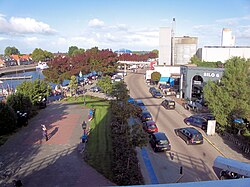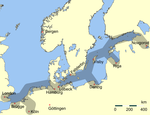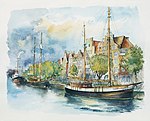world.wikisort.org - Netherlands
Harderwijk (Dutch pronunciation: [ˌɦɑrdərˈʋɛik] (![]() listen); Dutch Low Saxon: Harderwiek) is a municipality and city of the Netherlands.
listen); Dutch Low Saxon: Harderwiek) is a municipality and city of the Netherlands.
Harderwijk
Harderwiek (Veluws) | |
|---|---|
Municipality | |
 Harbour of Harderwijk seen from windmill De Hoop | |
 Flag  Coat of arms | |
 Location in Gelderland | |
| Coordinates: 52°21′N 5°37′E | |
| Country | Netherlands |
| Province | Gelderland |
| Government | |
| • Body | Municipal council |
| • Mayor | Harm-Jan van Schaik (CDA) |
| Area | |
| • Total | 48.27 km2 (18.64 sq mi) |
| • Land | 38.89 km2 (15.02 sq mi) |
| • Water | 9.38 km2 (3.62 sq mi) |
| Elevation | 3 m (10 ft) |
| Population (January 2019)[4] | |
| • Total | 47,581 |
| • Density | 1,223/km2 (3,170/sq mi) |
| Demonym(s) | Harderwijker |
| Time zone | UTC+1 (CET) |
| • Summer (DST) | UTC+2 (CEST) |
| Postcode | 3840–3849 |
| Area code | 0341 |
| Website | www |

It is served by the Harderwijk railway station.
Its population centres are Harderwijk and Hierden.
Harderwijk is on the western boundary of the Veluwe. The southeastern half of the municipality is largely forests.
History
Harderwijk received city rights from Count Otto II of Guelders in 1231.[5] A defensive wall surrounding the city was completed by the end of that century. The oldest part of the city is near where the streets Hoogstraat and Grote Poortstraat now are. Around 1315 the city was expanded southwards, which included the construction of what is now called the Grote Kerk (Great Church). A second, northward expansion took place around 1425.
Particularly along the west side of town, much of the wall still exists but often not in entirely original form. That also goes for the only remaining city gate, the Vischpoort (Fish Gate).
Between 1648 and 1811, the University of Harderwijk operated in the city. The Swedish botanist, physician and zoologist, Carl Linnaeus graduated at this university. The university, together with the universities of Zutphen and Franeker, was abolished by Napoleon.
Harderwijk was a member of the Hanseatic League. It lies on what used to be the Zuiderzee shore (Southern Sea, now the IJsselmeer) and consequently its economy was strongly based on fishing and seafaring in general. That dramatically changed after 1932, when the Zuiderzee was cut off from the North Sea for safety reasons. Few fishing boats thus now remain in the Harbour, which now is home mainly to yachts. An annual event illustrating the former importance of the fishing industry to Harderwijk is Aaltjesdag, which translates to Eel day. Fish can still be bought at stands and restaurants on the boulevard throughout the year except for the winter months. Tourists are common customers, but local people no longer make their living from the fisheries.
Today, Harderwijk is probably known best for the Dolfinarium Harderwijk, a marine mammal park where dolphin shows are held and various other marine mammals and fish are kept.
Notable residents

- Henriëtte van der Meij (1850-1945) early Dutch feminist and journalist
- Theo de Meester (1851–1919), politician and Prime Minister 1905-1908
- Johan Mekkes (1898–1987) a Dutch reformational philosopher
- Dirk Rijnders (1909–2006), politician
- A. H. J. Prins (1921–2000) a Dutch Africanist and maritime anthropologist
- Herman Bouma (born 1934) a Dutch vision researcher and gerontechnologist
- Henk Schiffmacher (1952), a Dutch tattoo artist
- Harry van den Brink (born 1961) commander of the Royal Marechaussee
- Roef Ragas (1965–2007), actor [6]
- Joost Eerdmans (1971), TV host & politician
Sport
- Marco Roelofsen (1968), Dutch football midfielder
- Richard Roelofsen (1969), Dutch football striker, over 430 club caps
- Henk Timmer (1971), Dutch football goalkeeper with 522 club caps
- Liesbeth Migchelsen (born 1971) a Dutch former footballer, played for the Netherlands women's national football team 95 times
- Marianne Timmer (1974), speedskater, twice gold medallist at the 1998 Winter Olympics
- Jan Bos (1975), speedskater, twice silver medallist at the 1998 and 2002 Winter Olympics
- Monique Jansen (born 1978) a Dutch discus thrower, competed at the 2012 Summer Olympics
- Theo Bos (1983), cyclist, silver medallist at the 2004 Summer Olympics
- Annemarie Worst (born 1995) a Dutch mountain-bike and cyclo-cross cyclist
- Lisa Kruger (born 2000) a Dutch paralympic swimmer
Gallery
- Map of Harderwijk (Blaeu's Toonneel der Steden, by Willem and Joan Blaeu, 1652. Note that north is at the bottom of the map.
- Harderwijk, church: de Grote Kerk
- Harderwijk, gate: de Vischpoort
- Harderwijk, view of a street: de Vischmarkt (Fish Market)
- Harderwijk, view to the town from het Zeepad
- Harderwijk, defensive wall, cannon and church tower
- Harderwijk, windmill
- Harderwijk: het Linnaeustorentje (the Linnaeus tower)
References
Footnotes
- "Samenstelling" [Members] (in Dutch). Gemeente Harderwijk. Retrieved 17 June 2014.
- "Kerncijfers wijken en buurten 2020" [Key figures for neighbourhoods 2020]. StatLine (in Dutch). CBS. 24 July 2020. Retrieved 19 September 2020.
- "Postcodetool for 3841AA". Actueel Hoogtebestand Nederland (in Dutch). Het Waterschapshuis. Retrieved 17 June 2014.
- "Bevolkingsontwikkeling; regio per maand" [Population growth; regions per month]. CBS Statline (in Dutch). CBS. 1 January 2019. Retrieved 1 January 2019.
- Stenvert, R. et al. (2000). Monumenten in Nederland: Gelderland, p. 50 and 183–188. Zwolle: Waanders Uitgevers. ISBN 90-400-9406-3
- IMDb Database retrieved 10 March 2020
Bibliography
- This article incorporates text from a publication now in the public domain: Chisholm, Hugh, ed. (1911). "Harderwyk". Encyclopædia Britannica (11th ed.). Cambridge University Press.
External links
 Media related to Harderwijk at Wikimedia Commons
Media related to Harderwijk at Wikimedia Commons- Official website
На других языках
- [en] Harderwijk
[ru] Хардервейк
Хардервейк (нидерл. Harderwijk) — город и община в Нидерландах. 45 468 жителей (2012); древние церкви, городская стена, бывший ганзейский город.Другой контент может иметь иную лицензию. Перед использованием материалов сайта WikiSort.org внимательно изучите правила лицензирования конкретных элементов наполнения сайта.
WikiSort.org - проект по пересортировке и дополнению контента Википедии












